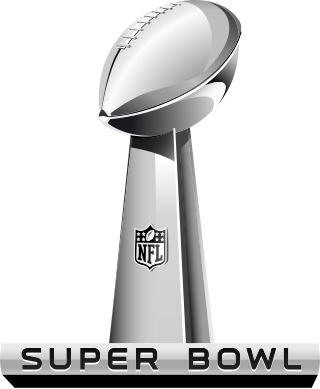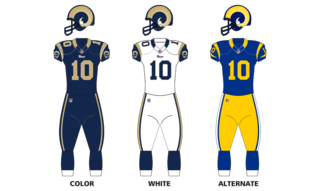Related Research Articles

The American Football League (AFL) was a major professional American football league that operated for ten seasons from 1960 until 1970, when it merged with the older National Football League (NFL), and became the American Football Conference. The upstart AFL operated in direct competition with the more established NFL throughout its existence. It was more successful than earlier rivals to the NFL with the same name, the 1926, 1936 and 1940 leagues, and the later All-America Football Conference.

The Super Bowl is the annual league championship game of the National Football League (NFL) of the United States. It has served as the final game of every NFL season since 1966, replacing the NFL Championship Game. Since 2022, the game has been played on the second Sunday in February. Prior Super Bowls were played on Sundays in early to mid-January from 1967 to 1978, late January from 1979 to 2003, and the first Sunday of February from 2004 to 2021. Winning teams are awarded the Vince Lombardi Trophy, named after the eponymous coach who won the first two Super Bowls. Because the NFL restricts use of its "Super Bowl" trademark, it is frequently referred to as the "big game" or other generic terms by non-sponsoring corporations. The day that the game is held, is commonly referred to as "Super Bowl Sunday" or simply "Super Sunday".

The National Football Conference (NFC) is one of the two conferences of the National Football League (NFL), the highest level of professional American football in the United States. The NFC and its counterpart, the American Football Conference (AFC), each have 16 teams organized into four divisions.
Throughout its history, the National Football League (NFL) and other rival American football leagues have used several different formats to determine their league champions, including a period of inter-league matchups to determine a true national champion.

The American Football Conference – Western Division or AFC West is one of the four divisions of the American Football Conference (AFC) in the National Football League (NFL). The division comprises the Denver Broncos, Kansas City Chiefs, Las Vegas Raiders, and Los Angeles Chargers.

The National Football Conference – Eastern Division or NFC East is one of the four divisions of the National Football Conference (NFC) in the National Football League (NFL). It currently has four members: the Dallas Cowboys, New York Giants, Philadelphia Eagles, and the Washington Commanders.

The 1966 NFL season was the 47th regular season of the National Football League, and the first season in which the Super Bowl was played, though it was called the AFL-NFL World Championship Game. The league expanded to 15 teams with the addition of the Atlanta Falcons, making a bye necessary one week for each team.

The St. Louis Rams were a professional American football team of the National Football League (NFL). They played in St. Louis, Missouri from 1995 through the 2015 season, before moving back to Los Angeles, California, where the team had played from 1946 to 1994.
The Super Bowl curse is a phrase that refers to phenomena that may occur in the National Football League (NFL) where the team whose stadium will host the upcoming Super Bowl either misses the playoffs or suffers early postseason elimination.

The Los Angeles Rams are a professional American football team based in the Greater Los Angeles area. The Rams compete in the National Football League (NFL) as a member of the National Football Conference (NFC) West division. The Rams play their home games at SoFi Stadium in Inglewood, which they share with the Los Angeles Chargers.
As with all sports leagues, there are several significant rivalries between teams and notable players in the National Football League (NFL). Rivalries are occasionally created due to a particular event that causes bad blood between teams, players, coaches, or owners, but for the most part, they arise simply due to the frequency with which some teams play each other and sometimes exist for geographic reasons.
This timeline of the National Football League (NFL) tracks the history of each of the league's 32 current franchises from the early days of the league, through its merger with the American Football League (AFL). The history of franchises that began as independent teams, or as members of the Ohio League, New York Pro Football League, and other defunct leagues are shown as well.
The Los Angeles Rams are a professional American football team that plays and competes in the National Football League (NFL). The Rams franchise was founded in 1936 as the Cleveland Rams in the short-lived second American Football League before joining the NFL the next year. In 1946, the franchise moved to Los Angeles. The Rams franchise remained in the metro area until 1994, when they moved to St. Louis, and were known as the St. Louis Rams from 1995 to 2015. The Rams franchise returned to Los Angeles in 2016. This article chronicles the franchise's history during their time in Los Angeles, from playing at the Los Angeles Memorial Coliseum between 1946 and 1979, to playing at Anaheim Stadium in Anaheim from 1980 to 1994, and its return to Southern California beginning with the 2016 to 2019 seasons playing temporarily at their old home the Los Angeles Memorial Coliseum before moving to SoFi Stadium in Inglewood in 2020 alongside the Los Angeles Chargers.
From 1960 to 1987, the professional American football team now known as the Arizona Cardinals played in St. Louis, Missouri, as the St. Louis Cardinals.

The Cardinals–Rams rivalry is an American football rivalry between the National Football League (NFL)'s Arizona Cardinals and Los Angeles Rams. One of the oldest matchups in the league, the two teams met for the first time during the NFL's infancy in 1937 back when the Cardinals were located in Chicago, and the Rams in Cleveland. State Farm Stadium and SoFi Stadium are only 375 miles apart, mostly along I-10. The Rams lead the series 50–40–2. The teams met twice in the playoffs, two Rams wins in the 1975 NFC Divisional Round and the 2021 NFC Wild Card Round. Both teams were also previously based in St. Louis and left to play in the Western United States.
References
- "Los Angeles Rams History". CBS Sports. Retrieved March 18, 2016.
- "Saint Louis Rams". Sports E-cyclopedia. Retrieved April 11, 2007.
- "NFL.com – History – Yearly Standings". NFL Official Website. Retrieved March 18, 2016.
- "Pro Football Hall of Fame – Los Angeles Rams". Pro Football Hall of Fame Website. Retrieved March 18, 2016.
- "databaseFootball.com – St. Louis Rams". databaseFootball.com. Archived from the original on April 10, 2007. Retrieved April 11, 2007.
- John Troan. "Football @ JT-SW.com – St. Louis Rams". Rams history page. Retrieved April 14, 2012.